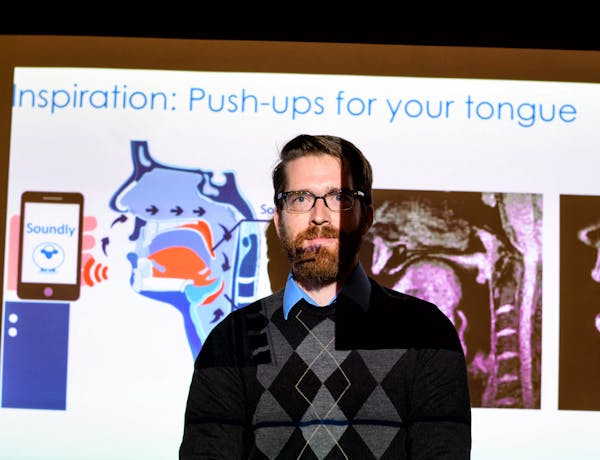"Nee-nee-nee-nee-nee-nee-nee. Naw. Nee-nee-nee. Naw-naw-naw-naw."
Brian Krohn is chanting into his phone, which is displaying animated missiles shooting down a red whale.
It's a new smartphone app, a voice-controlled game that Krohn has helped develop to get users to perform what he calls "pushups for your tongue."
The app, called Soundly (sleepsound.ly), just might be a cure for snoring, according to the young St. Paul entrepreneur and inventor, who developed the game with colleagues at the University of Minnesota's Earl E. Bakken Medical Devices Center.
Soundly is a bit like the old Space Invaders arcade game, in which your character moves back and forth along the bottom of the screen to shoot down targets. But instead of pushing buttons with your thumbs, you control your character by saying "nee" to move your character to the right, and "naw" to move it to the left.
According to Krohn, those two words alternatively push the base of the tongue back or forward in your mouth, which tones and strengthens the upper airway muscles.
Weak and flabby airway muscles can cause snoring, which affects more than 90 million Americans. Snoring has been linked to sleep apnea, which, in turn, is linked to a host of ailments ranging from heart disease to depression. There are other treatments for snoring, but wearing mouthpieces and CPAP machines can be bothersome and expensive.
Soundly started when Dr. Umesh Goswami, a sleep expert at the university, showed Krohn a Swiss study which found that people who were taught to play the didgeridoo snored less, possibly because playing the Australian wind instrument develops stronger upper airway muscles.
Other studies have found that singing exercises and strengthening drills involving the tongue, palate and facial muscles have helped with snoring or apnea.
Consulting with game designers, Krohn turned the idea into an app, a gallery shooting game that he hoped would encourage people to do the vocal exercises for the recommended 15 minutes a day.
"It's physical therapy," Krohn said. "But we make it fun."
The project has received a $50,000 grant from the National Science Foundation to evaluate the device's commercial potential, and Krohn, Goswami and another Medical Devices Center innovation fellow formed a company to bring it to market.
A clinical trial funded by the National Institutes of Health and done by U doctors at the Fairview Sleep Center showed that eight snorers who tried the app for nine weeks had an average reduction of snoring of about 23 percent based on recordings made of them sleeping.
"It's an app, but it's serious science," Krohn said.
The app is undergoing beta testing, but Krohn and his colleagues hope to make it available by the end of the year. (The app leads users through six weeks of daily exercises, followed by maintenance exercises. He expects it will be available on a subscription basis, costing about $10 a month.)
While it's being marketed as a snoring aid, Krohn wants to research whether it can also help people with sleep apnea, which would need FDA approval.
Krohn's mother, Mary Krohn, uses a CPAP machine for her sleep apnea. But she's been testing her son's app.
"This is more fun for me than Candy Crush," she said.
